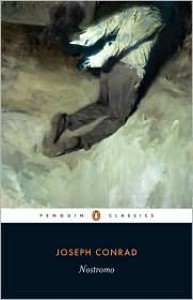What I am reading
this is the highly subjective way I read and interpret literature
(I mostly read classic belles-lettres, but you’ll find some examples of trashy readings here and there as well)
Political relativism on the highest level

Why did it take me so long to finish Nostromo? First of all, life. I don’t know about you guys and girls, but my past weeks, even months were busy and crazy af. Secondly, for various reasons, 6 other books squeezed themselves in between since I started Nostromo in April, which – in hindsight – was not helping the reading experience, because this is a very complex novel.
Therefore the already confusing political circumstances became even more confusing for me, because after a long break from Nostromo, during which I might have read two or three different books, I often forgot or confused some of the characters and hence was a bit lost plotwise. But hey, that’s what times filled with revolutions and counter-revolutions are all about – chaos and confusion. So in this regard, I guess I got the full experience.
Nostromo is set in Costaguana, a fictitious republic somewhere in South America. The novel moves quite slowly at the beginning, so initially you have a lot of time to get acquainted with the main characters, the setting and some early events along the storyline. The slow pace is a good thing though, because honestly this novel takes some time to get used to, but the more I progressed, the more it grew on me. With the exception of the last few chapters which are slower again, Conrad really picks up the speed in approximately the last third of his novel – stuff is happening left, right and centre, the perspective is shifting within the chapters, time jumps back and forth and as mentioned before, after taking a long break and reading something else in between, I admit that I struggled quite a bit to pick up where I left, but there is only myself to blame for that.
This is a very political and very complex novel (well, it is written by Conrad after all) about revolutions, counter-revolutions, political scheming, speculation, exploitation, colonization, morals, individual monomaniacal ideas, and everything in between. Even if you read Nostromo without taking crazy long breaks, it is easy to loose focus and I somehow have the feeling that even Conrad himself was on the verge of getting lost in the events of his own novel from time to time.
Somehow Nostromo reminded me a lot of For Whom the Bell Tolls, especially regarding the South American way of revolting and not really caring at the same time. Yet the political relativism expressed by Conrad surpasses Hemingway by miles! Conrad challenges the whole notion of linear historical progress by presenting a cyclical repetition of events that ultimately renders every decision and action basically irrelevant. One of my favourite sentences from the novel’s preface, that sums up this point really well, is: „Nostromo’s narrative structure generates a similar chaos by blurring cause and effect.“ I couldn’t have said it any better.
As I mentioned in one of my first Nostromo posts, the character Nostromo appears very scarcely (similar to Quasimodo in The Hunchback of Notre Dame), even though there is a sheer mountain of secondary literature dealing solely with Nostromo, his motives and/or his psychology. Personally, I didn’t much care for him, and neither did Conrad apparently (as expressed in one of his letters): „I don’t defend Nostromo himself. Fact is he does not take my fancy either.“
One more thing editing-wise. The editor added quite a number of notes and annotations to the text, most of which is helpful background info about historical events, literary sources or just a general help for some of the strange sounding expressions for which Conrad used a one-to-one translation of a Gallicism into English. But if I ever meet the editor (which is highly unlikely), I will personally punch her in the face for one of the notes in which she completely spoilers the death of a character without any warning! This particular character just got introduced in the very chapter in which said annotation is placed and it happens to be the one character I immediately fell in love with and really cared about.
But to finally wrap this up: the 3,5 out of 5 stars reflect my personal reading experience (which was a rather rugged one) rather than the actual quality of Nostromo. Because to do such a novel justice, I would have to re-read while being more focused which I will do at some point in the future.







 2
2
